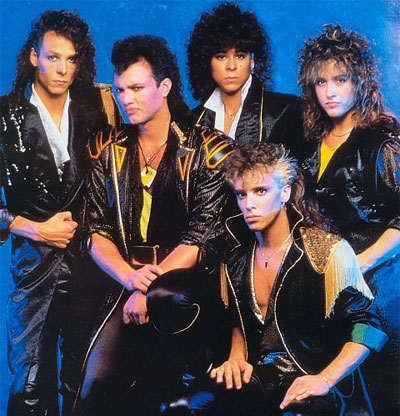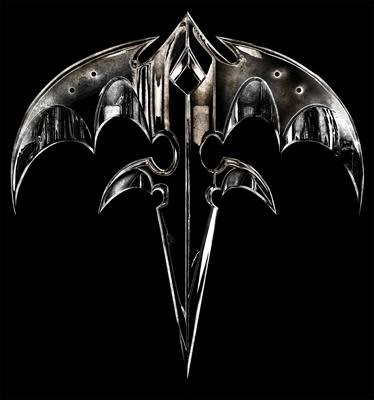Once the support tour for the EP was finished, EMI flew the band to London to begin work on their debut full-length album, along with producer James Guthrie, known for his work with progressive rock legends Pink Floyd and heavy metal pioneers Judas Priest. Titled The Warning, the album was recorded in several different London studios, including Abbey Road, and was released on September 7th, 1984. The effort continued on the success of the self-titled EP, climbing to No. 61 on the Billboard 200 while also charting in the UK, Sweden and Canada. Despite its success, the band was never happy with the album, as Tate explained years later that it was the only time in his career when a label took creative control over, taking the band completely out of the mixing process for the album. The label would take that meddling a step further on their next album, insisting the band adopt a more fan-friendly, glam rock look. To support the release, Queensrÿche toured for nearly a year, opening for legendary rock band KISS and then Iron Maiden.
During their tours with KISS and Iron Maiden, Queensrÿche spent travel days writing songs for their next album, and were ready to head back into the studio when the tour wrapped in late 1985. Not happy with the final result on The Warning, the band chose to search for a new producer to work with, going with Neil Kernon, who had helmed Autograph's 1984 debut Sign In Please and Dokken's 1985 album Under Lock and Key. The resulting album was more progressive than the band's previous work, with the two guitars playing separate parts more often, and a much bigger sampling of Tate's keyboard playing. Titled Rage for Order, the album was released June 27th, 1986. But while Queensrÿche was moving in a progressive metal direction musically, EMI wanted to market the band along the wave of glam metal acts thriving at the time, such as Bon Jovi, Dokken and Ratt. As a result, promo photos of the band from that era picture the band wearing heavy eye makeup and sporting big, glam-inspired hairdos. Rage for Order's first single was a cover of a song entitled "Gonna Get Close to You," originally released by Canadian pop star Dalbello, and the glam look was prevalent in the video for the song as well. The contradiction between Queensrÿche's evolving sound and EMI's marketing efforts caused some confusion about just what type of band Queensrÿche was, but also helped the band gain popularity across genres. The confusion and crossover appeal of the band was also impacted when EMI sent the band out on tour with Ozzy Osbourne and then Bon Jovi.
 Queensrÿche - Rage for Order promo pic
Queensrÿche - Rage for Order promo pic
|
|
|
|
|
While Rage for Order is by no means considered Queensrÿche's best release, it represents an integral time in the band's development, and die-hard metal fans consider it an important contribution to the development of progressive metal. The effort has been included in numerous Top 500 lists of rock and metal albums, and was listed at No. 88 on Kerrang!'s "100 Greatest Heavy Metal Albums" list published in January 1989. While not yet among the biggest metal bands in the country, Queensrÿche had managed to pique the interest of fans of several genres, and was about to clear up the confusion about the direction they were going in musically with what would prove their biggest commercial success yet. As Queensrÿche was coming in to its own, it became glaringly obvious that this was no glam band, but one of the most solid progressive metal bands the movement would ever produce.
On the heels of its tour with Bon Jovi, Queensrÿche entered the studio with a sense of resolve that they would not allow the industry to determine their look or their sound. Their next move, they decided, would be to release a concept album in the vein of Pink Floyd's The Wall or The Who's Tommy. They also decided on a change at producer, wanting to find somebody with a history of working with progressive bands. The band eventually decided on Peter Collins, who, despite having worked with a number of pop bands, had gained a reputation working on several albums for Rush, considered the kings of the progressive rock genre at the time. With Collins behind the console, Queensrÿche laid down its third studio album in late '87 and early '88. Titled Operation: Mindcrime, the album was released May 3, 1988, garnering tremendous critical acclaim and thrusting Queensrÿche into the forefront of the progressive metal movement. The album charted in nearly every market around the world where sales were tracked at the time, rising to No. 50 on the Billboard 200. The album was certified gold for selling more than 500,000 copies in less than a year, and achieved platinum certification (1 million-plus copies sold) by 1991. The track "I Don't Believe In Love" was released as a single, and earned a Grammy nomination a year later in the category of "Best Metal Performance".
|
"I Don't Believe In Love" video
|
Like its predecessor, Operation: Mindcrime is considered a very important piece of work in the progressive metal scene. The album is included on nearly every list ever compiled of the Top 500 Heavy Metal albums, and was bestowed the No. 34 ranking on Kerrang!'s 1989 list of the "100 Greatest Heavy Metal Albums of All Time". In addition, the effort is considered one of the greatest concept albums ever produced. Over the years, the band would embark on several tours in which it played Operation: Mindcrime in its entirety, a pair of which were recorded for live album releases (Operation: Livecrime in '91 and Mindcrime at the Moore in 2007). While Operation: Mindcrime was not ultimately Queensrÿche's most commercially successful release, many diehard fans consider it their favorite, and the album had more legs than than all but a handful of metal albums ever, generating new, related material for nearly two decades after its release. The album also helped define the progressive metal sound as it emerged from the broader progressive rock movement; and is cited as a major influence by the bands that followed, including Tool and Dream Theater.
Queensrÿche released a pair of videos from Operation: Mindcrime, gaining valuable exposure for the band through heavy airplay on MTV. The "I Don't Believe In Love" video was particularly popular when it was released in early 1989, and spawned a ravenous legion of new fans for the band. Queensrÿche spent most of '88 and '89 on the road in support of Operation: Mindcrime, sharing bills with Metallica, Def Lepard and Guns N' Roses. Opting for the same producer on back-to-back albums for the first time, the band began recording its fourth album in the Spring of 1990, releasing the effort on August 20th of the same year. Titled Empire, the album would prove to be Queensrÿche's biggest-selling album ever, fueled by a lead single that is considered one of the quintessential ballads from any of the various sub-genres of heavy metal. Entitled "Silent Lucidity," the single spent numerous weeks atop Billboard's Mainstream Rock Songs chart, while also charting in the UK. The single earned a pair of Grammy nominations, helping the album climb all the way to No. 9 on the Billboard 200 albums chart. Empire is still Queensrÿche's only multi-platinum release, earning triple platinum status in 1991 for selling 3 million copies in the US alone.
|
|
|
The success of Empire earned Queensrÿche its first extended headlining tour, which spawned the band's first live album and an accompanying VHS/DVD release. Dubbed the "Building Empires" tour, the trek lasted 18 months, making it the band's longest tour ever. The tour also included an appearance on the MTV Unplugged show, recorded in late April 1992. After the tour was done, the band took several months off to recover from the difficult tour. Not only was the tour hard because of the 18 months on the road, there was also an incident at a November 1990 performance in Belgium where an American fan was fatally stabbed during a scuffle in the audience. The incident forced the band to finish their set after just seven songs, and left an indelible impression on the band moving forward. The grueling nature of touring also sparked tension between band members, and that tension would plague the band from then on, eventually leading to DeGarmo's departure in 1997 and Tate's dismissal in 2012. Despite the break, a still road-weary Queensrÿche entered the studio in August 1992 to begin working on a fifth full-length album.
|
"Silent Lucidity" - Live on MTV Unplugged
|
|
Promised Land was released October 18, 1994, earning the band its highest chart position ever. The album rose to No. 3 on the Billboard 200, while also reaching the top 100 on the German and Swedish charts. The album also achieved platinum certification faster than Empire, though sales would ultimately be much lower as Promised Land never even achieved double platinum status. Despite the album's initial success, sales waned quickly as the popularity of heavy metal was fading with the rise of the grunge and alternative rock movements. In a mostly-unsuccessful effort to boost sales, a companion CD-Rom was released in March 1996, featuring a video game based on the album and other interactive content. The band toured sporadically in support of Promised Land through the summer of 1996, took a few months off and began working on album number 6 late that year.
Hear in the Now Frontier was released on March 25th, 1997. The band's loyal fan base helped the album debut at No. 19 on the Billboard 200, but it only stayed on the chart a few weeks as sales plummeted and the record never achieved platinum status. Reception for the album was mixed, with some fans and critics unhappy with the grunge elements incorporated into the set. Others, meanwhile, were disappointed for the opposite reason, worried that the band were simply unwilling to adapt to the changing musical scene. A pair of singles, "Sign of the Times" and "You" received a fair amount of airplay, but the mainstream had moved on at that point to grunge, which ironically developed in the Seattle area. Guitarist Chris DeGarmo sang lead vocals on the track "All I Want," making it the first Queensrÿche song yet to be sung by somebody besides Geoff Tate. It would be the last, however, as DeGarmo would leave the band during the ensuing tour. The guitarist would go on to become a very successful business jet pilot, with only sporadic involvement in music.
DeGarmo did collaborate with Queensrÿche again during the recording of their 2003 album Tribe, but left before the sessions were completed and did not perform with the band as they toured in support of the album. DeGarmo continues to be revered by Queensrÿche fans to this day, and his departure was a difficult blow, as he played a significant part on most of the band's biggest releases. During his 17-year tenure with the band, DeGarmo co-wrote "The Lady Wore Black," "Take Hold of the Flame," "I Don't Believe In Love," and "Eyes of a Stranger"; and single-handedly wrote the biggest hit in the band's career, "Silent Lucidity." In fact, a review of writing credits on the first six Queensrÿche albums reveals that DeGarmo wrote or co-wrote more songs than any other member. As a result, loyal Queensrÿche fans were concerned about who was going to fill the void left by the band's most prolific songwriter.
|
 Queensrÿche Guitarist and Songwriter Chris DeGarmo
Queensrÿche Guitarist and Songwriter Chris DeGarmo
|
|
While replacing DeGarmo as a principal songwriter would have to involve all the remaining band members, the band turned to Kelly Gray to try and fill his role as a guitarist. Gray had been a part of the band Myth when Tate had first become a permanent member of Queensrÿche, and the two remained friends throughout the years. Gray had developed a reputation as a talented producer, working with bands such as Dokken, Candlebox and others. Because of his production experience, the band decided to produce their seventh album themselves. With the lineup complete, the band turned its attention to securing a new recording contract, eventually signing with Atlantic. Their first, and only, release on the label was Q2K, released on September 14, 1999. The album did manage to reach No. 46 on the Billboard 200, but only because nobody was selling records at the time. As the music industry was transitioning to a new world where digital streaming and downloads were as or more important that record sales, there were but a few artists in the entire world at the time making decent money through album sales. The band's declining popularity forced the band to book gigs at clubs and other smaller venues as opposed to the large arenas and stadiums they'd grown accustomed to playing at the height of their popularity.
Following the Q2K tour, several Queensrÿche members took some time off to pursue side projects. Rockenfield and Gray founded a band called Slave to the System, releasing an eponymous debut album in 2002; while Tate recorded his first solo album, dropping the self-titled effort in June of 2002. Displeased with the marketing efforts from Atlantic, the band also switched labels, signing with Sanctuary Records. A Greatest Hits record was released on the label, just as the band embarked on its first non-headlining tour since 1988, in support of Iron Maiden. The opening slot allowed the band to perform at New York's Madison Square Garden for the first time, as Maiden was one of the handful of artists still selling records at that point. After the tour, the band played a series of shows at Seattle's Moore Theatre, recording the performances and compiling them into the band's second live album, Live Evolution, released in September 2001. Gray was dismissed from the band in May of 2002, but was not immediately replaced as the band was attempting to convince DeGarmo to come back. DeGarmo did take part on the band's seventh album, but left again before the album was finished and did not take part in the ensuing support tour.
With DeGarmo out of the band for the second time, the band turned to Mike Stone to finish the record and fill the rhythm slot on the ensuing tour while Wilton handled lead. Stone had taken part on Tate's eponymous solo debut after a stint as the guitarist in the solo band of iconic KISS drummer Peter Criss. Queensrÿche's eighth album, Tribe, was released on Jul 22, 2003. The effort charted, reaching No. 56 on the Billboard 200; but sales were disappointing. To support the album, the band embarked on a co-headlining tour with fellow progressive metal heavyweights Dream Theater. It was after this tour that Queensrÿche fired their manager, Lars Sorensen, and promoted Tate's wife Susan to the post. Also in 2003, Wilton took time off to record an eponymous debut for his side project dubbed Soulbender, though the record wouldn't be released until May 2004. Queensrÿche then turned its attention to writing and promoting a sequel to its revered concept album, Operation: Mindcrime, revealing the plan to fans in July of 2004. Recording began in the fall of 2004, and would continue through most of 2005, with sessions at three different studios. The band also switched labels, signing a multi-album deal with Rhino Entertainment.
Operation: Mindcrime II was released on March 31, 2006, earning the band its highest chart position in 12 years with a debut at No. 14 on the Billboard 200. Notably, the album featured a contribution from legendary Black Sabbath, Rainbow and Dio frontman Ronnie James Dio, who portrayed the role of villain "Dr. X", which had been played by actor Anthony Valentine on the original Operation: Mindcrime. The role of "Sister Mary", meanwhile, was played once again by Pamela Moore, who also accompanied the band on a subsequent support tour. The album was the first Queensrÿche effort to be produced by Jason Slater, who would go on to record two more albums for the band before Tate was fired, plus the 2013 album recorded by Tate's version of the band after the split. Years later, Slater revealed that Operation: Mindcrime was recorded with very limited contributions from any band members besides Tate and Stone. Due to the growing tension between Tate and the band's founding members, most of the album was recorded using studio musicians, and drummer Scott Rockenfeld did not even play on the release. The band emarked on an extensive headlining tour during which both Operation: Mindcrime albums were played from start to finish, with encores consisting of the band's biggest hits not on one of the two concept releases. Ronnie James Dio showed up at one of the shows, in Universal City, CA, to perform his "Dr. X" parts. This appearance was recorded, and included as an extra on the band's 2007 DVD release, Mindcrime at the Moore.
|
Queensrÿche Live feat. Ronnie James Dio as "Dr. X"
Queensrÿche toured in support of Operation: Mindcrime II for just over a year, taking a few months off in late summer '97 to record Take Cover, a covers album featuring the band's take on classic tracks from Black Sabbath, The Police, Queen, Peter Gabriel and others. A Greatest Hits compilation was released that year, as well. Mike Stone would leave the band in early 2008, as the band was preparing to record an eleventh studio album, and was not replaced for the session, making American Soldier the first effort from the band recorded entirely as a four-piece. Released on March 31, 2009, American Soldier was Queensrÿche's third concept album, written entirely about the contributions and sacrifices made by members of the US military. The second guitar slot vacated by Stone was filled with Parker Lundgren, whom Tate had worked with on his solo tour. Following the American Soldier tour, the band took part in a traveling Queensrÿche Cabaret show, essentially an adult-themed, Broadway-style play featuring the band's music. The band finished 2010 with a series of USO-sponsored shows for US troops stationed in Iraq before going back into the studio to work on album number 12.
Dedicated to Chaos arrived in stores on June 28, 2011 to a less-than favorable reception from critics and fans alike. The album debuted at No. 70 on the Billboard 200, making it the lowest charting full-length in the band's history. According to a statement from Tate at the time, material was already being written for a follow-up to the poorly received album, and plans were already in place for the band to hit the studio in late 2012 to re-record Operation: Mindcrime for a 2013 release in recognition of the classic album's 25th anniversary. Those plans would never materialize, however, as Dedicated to Chaos would be the last Queensrÿche effort to include Tate and the three founding members of ther band. The band launched an extensive tour to support its latest release, beginning in the US and Europe before beginning a trek across South America in early 2012. The tensions that had built between bandmates would boil over during this tour, leading to the decision by Wilton, Rockenfield and Jackson to relieve Tate of his role as Queensrÿche's frontman.
To Be Continued...
|
|





